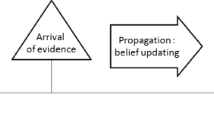Abstract
Shafer's theory of evidence has found much interest as a means to represent and manage uncertainty in reasoning. It is shown that an important part of this theory can be recast as a theory of reasoning with unreliable arguments. This places the problem within the framework of the reliability theory of binary, monotone systems. Methods from this well developed theory can thus be used in the context of reasoning under uncertainty. This opens new computational perspectives for combining evidence. In particular, it allows for a “backward chaining” approach in judging hypotheses in the light of unreliable information. As a consequence, mechanisms to explain the judgments of hypotheses can be designed. The approach will be illustrated especially by the problem of reasoning in inference networks with uncertain rules and uncertain facts.
Similar content being viewed by others
References
R. E. Barlow and F. Proschan,Statistical Models of Reliability and Life Testing. Probability Models (Holt, Rinehart and Winston, New York, 1975).
J. A. Barnett, Computational methods for a mathematical theory of evidence, in:Proc. IJCAI-81, Vancouver, BC (1981), pp. 868–875.
C.-L. Chang and R. C.-T. Lee,Symbolic Logic and Mechanical Theorem Proving (Academic Press, Boston, 1973).
A. P. Dempster, Upper and lower probabilities induced by a multivalued mapping, Ann. Math. Statist. 38(1967)325–339.
T. Kämpke, About assessing and evaluating uncertain inferences within the theory of evidence, Decision Support Systems 4(1988)433–439.
J. Kohlas,Zuverlässigkeit und Verfügbarkeit (Teubner, Stuttgart, 1987).
J. Kohlas, Conditional belief structures, Institute for Automation and Operations Research, University of Fribourg, CH-1700, 131(1987).
G. Shafer,A Mathematical Theory of Evidence (Princeton University Press, Princeton, 1976).
G. Shafer and R. Logan, Implementing Dempster's rule for hierarchical evidence, Art. Int. 33(1987) 271–298.
G. Shafer, P. Shenoy and K. Mellouli, Propagating belief functions in qualitative Markov trees, Int. J. Approximate Reasoning 1(1986)349–400.
J. Kohlas and P. A. Monney, Modeling and reasoning with hints, Institute for Automation and Operations Research, University of Fribourg, CH-1700, 174(1990).
P. Smets, Belief functions, in:Non-Standard Logics for Automated Reasoning, ed. P. Smets et al. (Academic Press, London, 1988).
G. M. Provan, A logic-based analysis of Dempster-Shafer theory, Int. J. Approximate Reasoning 4(1990)451–495.
K. B. Laskey and P. E. Lehner, Assumptions, beliefs and probabilities, Art. Int. 41(1989/90)65–77.
Author information
Authors and Affiliations
Rights and permissions
About this article
Cite this article
Kohlas, J. The reliability of reasoning with unreliable arguments. Ann Oper Res 32, 67–113 (1991). https://doi.org/10.1007/BF02204829
Issue Date:
DOI: https://doi.org/10.1007/BF02204829




